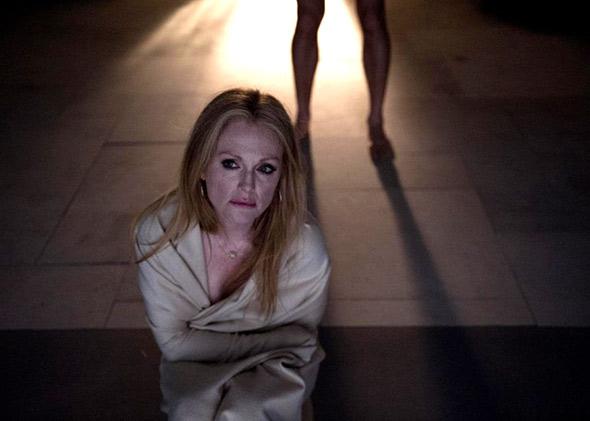David Cronenberg has never, bless his chilly, serenely uncommercial soul, gone Hollywood. But with Maps to the Stars, he has at last gone to Hollywood. This ghoulish satire set in the world of show-business strivers marks the first time in the Canadian director’s 45-year career that he’s made a film in the United States, much less one in and about that factory of dreams called Tinseltown. A Nathanael West–style morality play about the corrosive powers of stardom (and its enabling correlative, fandom), Maps to the Stars was scripted by the novelist Bruce Wagner, who specializes in scabrously funny entertainment-industry exposés that only occasionally bother to change the names of the real-life celebrities who drift through their pages.
This screenwriter’s pitiless perspective on the vanity and greed of the famous, the once famous, and the would-be famous would seem to be a good match with this director’s clinical eye and sick sense of humor. But Maps to the Stars takes place in a world that’s so blankly amoral, so devoid of the most basic ethical framework, that in many scenes it’s unclear which set of appalling on-screen behaviors we’re meant to be most sickened by. When every character is always operating at maximum loathsomeness, it can be difficult to recalibrate your disgust-o-meter. I suspect this sense of moral vertigo, and the resulting nausea, is part of what Cronenberg is after, but his skill at evoking those states in the viewer doesn’t make the experience of watching Maps to the Stars any less sour.
Not only Nathanael West but Billy Wilder seems to be lurking in the shadows here. (Or he would be if there were shadows to lurk in—as shot by longtime Cronenberg DP Peter Suschitzky, L.A. seems to exist in a sinister perpetual noon.) Like Sunset Boulevard, Maps to the Stars tells the story of a fading movie star who brings a younger assistant under her wing. Havana Segrand (Julianne Moore) is a past-her-prime actress who’s also the daughter of a now-deceased ’60s starlet. Having just fired another “chore whore,” as she calls her personal assistants with characteristic empathy, Havana is in search of a new gofer. She finds a willing one in Agatha (Mia Wasikowska), a naive young woman who, just arrived in L.A. from Florida, is a beauty but for her mysteriously fire-scarred hands and neck. As Agatha gets to know the town, she’s occasionally squired around by the limo driver and aspiring actor who picked her up at the airport (Robert Pattinson, spending his second consecutive Cronenberg film almost entirely inside a car). When the vain and high-strung Havana fails to land a longed-for starring role in a remake of her mother’s best-remembered film, she starts to unravel, pulling Agatha down with her—or is it the other way around?
In the meantime, Havana’s massage therapist and self-help guru Stafford Weiss (John Cusack) is having family problems. His teenage son Benjie (Evan Bird), a child star turned addict now trying to make a comeback, is more than just a soulless, narcissistic twerp—he may actually be a psychopath. Not that any of those traits would distinguish Benjie from either his vape pen–toting, platitude-intoning dad or his brittle and controlling mother (Olivia Williams), who’s willing to endure (and put her son through) any indignity to get Benjie back on the A-list.
To perform this merciless a dissection of actorly vanity, you’d better have a lineup of vanity-free actors. The cast offers up an impressive variety of grotesques, even if no performance seems to occupy quite the same tonal register as any other. Moore plays her character in high tragicomic mode: Though many sequences show the fragile Havana at her most emotionally flayed, she also has a long scene on the toilet in which she details her ongoing bowel troubles for her squirming assistant. Wasikowska’s sweet, self-effacing Agatha is the closest thing the film offers to a sympathetic heroine (at least until—well, never mind), but she’s no garden-variety damaged waif. Wasikowska’s ingénue mask never quite hides the barely repressed rage beneath. And as the repellent Benjie, Bird puts the pedal to the metal, creating the least likable character in a movie notably short on attempts at audience ingratiation.
When Havana and Agatha’s story and the Weiss family’s eventually cross paths, their convergence is attended by a whole novel’s worth of symbolic echoes and possibly supernatural coincidences. As the operatic finale approaches, Wagner’s script hints at the existence of a kind of karmic telekinesis whereby, at times, a character’s evil thoughts appear to bring about evil effects in the real world. Essentially, it’s the weaponization of fantasy—a genuinely fascinating moral idea, and also (if this adjective has any meaning after such a varied career) a deeply Cronenbergian one. I wish Maps to the Stars had spent more time in this queasy zone between sci-fi and psychological horror, and less in the by-now overfamiliar landscape of entertainment-industry satire, where the director seems both less original and less at home. Maybe what I’m trying to say, in the most loving way possible, is: David Cronenberg, please go back to Canada.
